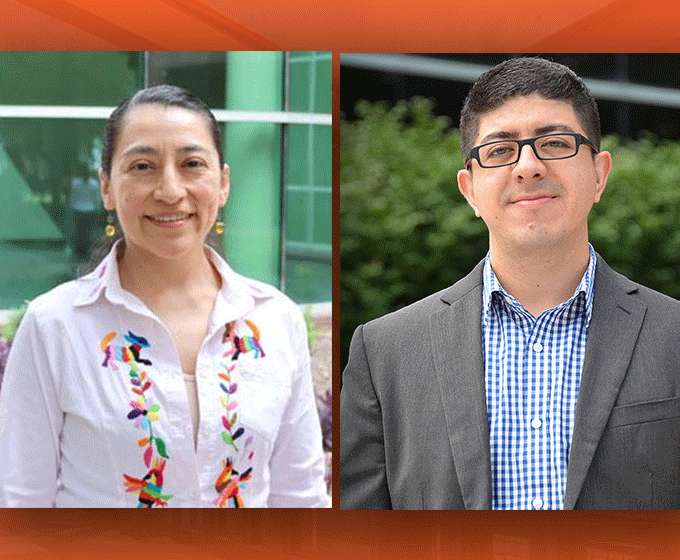
OCTOBER 24, 2023 — The National Science Foundation (NSF) has awarded a five-year, $3.6 million grant to two UTSA professors to develop a better way to communicate engineering acumen to diverse engineering classes.
Joel Alejandro Mejia and M. Sidury Christiansen are collaborating on an ethnographic project, “Rhetorical Engineering Education to Support Proactive Equity Teaching and Outcomes (RESPETO).” The project will include a handbook of recommended pedagogical approaches to address exclusionary language and linguistic practices in engineering classes.
The project was motivated by several factors. Among them, both professors experienced biases as they built their careers in STEM. Additionally, the researchers had many hours of conversation about how language use impacts engineering.
Their project supports what the NSF describes as investigations into the impact of racial equity on efforts to improve education and careers in the science, technology, engineering and mathematics (STEM) fields.
“I was one of those students who was seen as not being capable of performing well in math and science in school because I was classified as an English Language Learner,” said Mejia, an associate professor in the Margie and Bill Klesse College of Engineering and Integrated Design’s biomedical and chemical engineering departments.
“Even though I had already gone through precalculus classes in Mexico, I was placed in what is called ‘sheltered mathematics’ in the U.S. I was not given the opportunity to demonstrate to my teachers that I was more than just another number in a class designed to discourage students from pursuing higher dreams in STEM,” added Mejia, who has a joint appointment in the bicultural-bilingual studies department in the UTSA College of Education and Human Development (COEHD).
Christiansen, an associate professor of applied linguistics and Teaching English Speakers of Other Languages in COEHD’s bicultural-bilingual studies department, hopes they will be able to create materials and strategies to help faculty members and teaching assistants understand language’s impact on students pursuing STEM careers. They also hope to publish methods to evaluate the effectiveness of these strategies in order to help strengthen a sense of belonging among multilingual students. The hope is that by boosting that sense of belonging, it would, in turn, motivate multilingual students to continue to pursue engineering.
“Traditional research often extracts knowledge from marginalized communities, but in this study, we are empowering our students to share their experiences and engage in knowledge production,” said Christiansen. “As established researchers, we will use our platform to highlight students’ perspectives, steering away from the one-sided narratives that have dominated higher education research.”
Christiansen and Mejia will examine how race influences language use and how race-related language creates barriers for minority students pursuing engineering degrees. They also plan to educate engineering students and faculty on the use of biased race-related language that is pervasive in the field of engineering and guide them on strategies for changing it.
“Whether it's transforming perceptions of engineering, fostering critical awareness of language in STEM, or inspiring shifts in linguistic and educational practices, every small step forward brings us closer to dismantling systemic racism entrenched in the language we use,” Christiansen said. “This project is about making a difference that reverberates far beyond our academic circles and into the lives of those who are studying or thinking about studying STEM careers.”
UTSA Today is produced by University Communications and Marketing, the official news source of The University of Texas at San Antonio. Send your feedback to news@utsa.edu. Keep up-to-date on UTSA news by visiting UTSA Today. Connect with UTSA online at Facebook, Twitter, Youtube and Instagram.
Move In To COLFA is strongly recommended for new students in COLFA. It gives you the chance to learn about the Student Success Center, campus resources and meet new friends!
Academic Classroom: Lecture Hall (MH 2.01.10,) McKinney Humanities BldgWe invite you to join us for Birds Up! Downtown, an exciting welcome back event designed to connect students with the different departments at the Downtown Campus. Students will have the opportunity to learn about some of the departments on campus, gain access to different resources, and collect some giveaways!
Bill Miller PlazaCome and celebrate this year's homecoming at the Downtown Campus with food, games, giveaways, music, and more. We look forward to seeing your Roadrunner Spirit!
Bill Miller PlazaThe University of Texas at San Antonio is dedicated to the advancement of knowledge through research and discovery, teaching and learning, community engagement and public service. As an institution of access and excellence, UTSA embraces multicultural traditions and serves as a center for intellectual and creative resources as well as a catalyst for socioeconomic development and the commercialization of intellectual property - for Texas, the nation and the world.
To be a premier public research university, providing access to educational excellence and preparing citizen leaders for the global environment.
We encourage an environment of dialogue and discovery, where integrity, excellence, respect, collaboration and innovation are fostered.